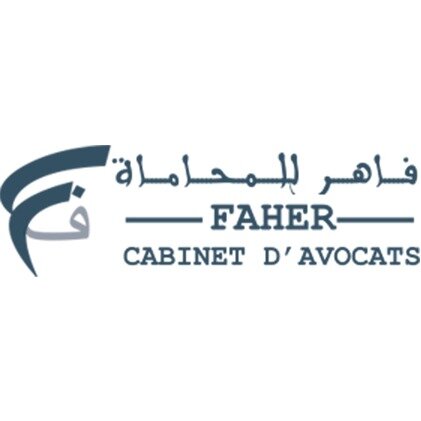Best Labor Law Lawyers in Morocco
Share your needs with us, get contacted by law firms.
Free. Takes 2 min.
Or refine your search by selecting a city:
List of the best lawyers in Morocco
About Labor Law in Morocco
Labor law in Morocco is a comprehensive framework that governs the relationships between employers and employees, ensuring the rights and obligations of both parties are respected and maintained. Rooted in the country's labor code, these laws cover areas such as minimum wage, working hours, health and safety standards, and employment contracts. Morocco's labor regulations aim to foster fair employment practices and protect the workforce from exploitation and discrimination.
Why You May Need a Lawyer
There are various situations where you might require legal assistance in matters related to labor law in Morocco. Common scenarios include disputes over unfair dismissals, disagreements regarding salary or benefits, issues with employment contracts, and conflicts involving workplace discrimination or harassment. A labor law lawyer can provide guidance, represent you in legal proceedings, and ensure that your rights are adequately protected.
Local Laws Overview
The Moroccan Labor Code is the principal legislation covering labor relations in Morocco. Key aspects include:
- Employment Contracts: They must be clear and in written form if exceeding a certain duration.
- Working Hours: The standard is 44 hours per week, and overtime must be compensated as per legal requirements.
- Minimum Wage: Set by the government and reviewed periodically to ensure it meets economic conditions.
- Safety and Health Regulations: Employers are obligated to provide a safe working environment.
- Termination of Employment: Specific procedures must be followed, including providing justified reasons and conducting a disciplinary process if needed.
- Social Security: Employers and employees contribute to a system that provides various benefits, including healthcare and pensions.
Frequently Asked Questions
What is the legal minimum wage in Morocco?
The minimum wage in Morocco is subject to regular revisions and varies depending on the sector, with a different rate for agricultural and non-agricultural workers. It's essential to check the most current rate set by government regulations.
How many days of paid annual leave am I entitled to?
Under Moroccan labor law, employees are entitled to 1.5 days of paid leave for every month of service after one year of employment, culminating in 18 days annually.
Can my employer terminate my contract without notice?
No, Moroccan law requires that employers provide a valid reason for termination and adhere to legal procedures, which usually include prior notice and, where applicable, severance pay.
What protections do I have against workplace discrimination?
Moroccan labor laws prohibit discrimination based on race, gender, disability, and several other factors, allowing employees to seek legal recourse if they face discrimination.
Is overtime work mandatory, and what compensation is required?
Overtime is typically voluntary unless specified in the employment contract, and workers must be compensated at higher rates for overtime hours.
What are my rights regarding maternity leave?
Female employees in Morocco are entitled to 14 weeks of paid maternity leave, with a portion of the salary covered by social security benefits.
How can I verify if my employer is contributing to social security?
Employees can inquire directly with the CNSS (Caisse Nationale de Sécurité Sociale) regarding their social security contributions, which employers are legally obligated to make.
Can collective layoffs occur without notice?
No, collective layoffs require employer justification and, typically, negotiation with employee representatives before implementation.
How are labor disputes resolved in Morocco?
Labor disputes can be addressed initially through mediation or negotiation. If unresolved, they move to labor courts, which adjudicate according to labor laws.
What is required to work legally in Morocco as a foreigner?
Foreign workers must obtain a work permit, often facilitated by the employer, and comply with immigration regulations to work legally in Morocco.
Additional Resources
For more information on labor law in Morocco, the following resources may be helpful:
- Ministère de l'Emploi et de la Formation Professionnelle: The Ministry of Employment and Professional Training is responsible for implementing labor laws.
- CNSS (Caisse Nationale de Sécurité Sociale): This is the social security administration that manages benefits and contributions.
- Labor Unions: Various labor unions provide support and advocacy for employee rights and grievances.
Next Steps
If you find yourself in need of legal advice or representation regarding labor law in Morocco, consider the following steps:
- Document all relevant information related to your employment issue, including contracts, communications, and timelines.
- Consult with a qualified labor law attorney who is familiar with Moroccan regulations and practices.
- Reach out to local labor unions or relevant governmental bodies for additional support and guidance.
- Prepare for any legal proceedings by gathering witnesses or evidence that supports your case.
- Stay informed about your rights and responsibilities under Moroccan labor law to better understand your position in any legal dispute.
Lawzana helps you find the best lawyers and law firms in Morocco through a curated and pre-screened list of qualified legal professionals. Our platform offers rankings and detailed profiles of attorneys and law firms, allowing you to compare based on practice areas, including Labor Law, experience, and client feedback.
Each profile includes a description of the firm's areas of practice, client reviews, team members and partners, year of establishment, spoken languages, office locations, contact information, social media presence, and any published articles or resources. Most firms on our platform speak English and are experienced in both local and international legal matters.
Get a quote from top-rated law firms in Morocco — quickly, securely, and without unnecessary hassle.
Disclaimer:
The information provided on this page is for general informational purposes only and does not constitute legal advice. While we strive to ensure the accuracy and relevance of the content, legal information may change over time, and interpretations of the law can vary. You should always consult with a qualified legal professional for advice specific to your situation.
We disclaim all liability for actions taken or not taken based on the content of this page. If you believe any information is incorrect or outdated, please contact us, and we will review and update it where appropriate.
Browse labor law law firms by city in Morocco
Refine your search by selecting a city.

















